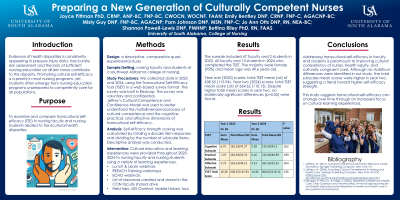Clinical Research
(CR-066) Preparing a New Generation of Culturally Competent Nurses

Evidence of racial disparities is consistently related to pressure injuries. Inaccurate skin assessment and the lack of equitable nursing education contribute to this disparity. Promoting cultural self-efficacy is a priority in most nursing programs, yet, students often emerge from nursing education programs unprepared to address cultural diversity. The purpose of this study was to examine transcultural self-efficacy in nursing faculty and students at a large southwest Alabama university’s College of Nursing.
Methods:
This was a descriptive quasi-experimental study to examine transcultural self-efficacy in nursing faculty and students at a southwest Alabama college of nursing. We collected data in 2023 and 2024, using the Transcultural Self-Efficacy Tool (TSET) in a web-based survey format. Self-efficacy strength scoring was calculated by totaling subscale item responses and dividing by the number of subscale items. Cultural learning experiences were provided during 2023-2024 to nursing faculty and students using a variety of learning experiences. Descriptive analysis was conducted.
Results:
The sample included 47 faculty and 2 students in 2023 and 45 faculty and 13 students in 2024, who completed the TSET. The majority were female (95%), the mean age was 49.6 years old, and a majority (99%) were non-Hispanic.
Year one (2023) scores: total TSET mean of 638.55 (sd 115.94). Year two (2024) scores: total TSET mean score of 664.62 (sd 110.13). Despite higher mean scores in year two, no statistically significant differences were found.
Discussion:
Evaluating cultural competency of nurses is a priority for healthcare systems and nursing education programs. Jeffrey’s Cultural Competence and Confidence Model was used in this study to better understand the multidimensional process of cultural competence and the cognitive, practical, and affective dimensions of transcultural self-efficacy.
Addressing transcultural self-efficacy in faculty and students is paramount to improving cultural competency of nurses, health equity, and culturally congruent care. Although no statistical differences were identified between 2023 and 2024, the mean scores were higher in year two, suggesting a trend toward higher self-efficacy strength. This study suggests transcultural self-efficacy can change over time through an increased focus on cultural learning experiences.

.jpg)